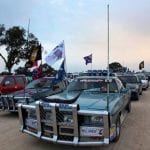Around The Web
Could California save the Tarkine by leasing it?
Climate change: Thousands invited to join citizens' assembly
Electric cars: Best and worst places to charge your car
Gerry Thomas questions our fear of nuclear power
The Aeronauts: Facts about fiction in Eddie Redmayne's new film
Fracking halted after government pulls support
Fracking banned in UK as government makes major U-turn
Victory for green groups follows damning scientific study and criticism from spending watchdog
The government has banned fracking with immediate effect in a watershed moment for environmentalists and community activists.
Ministers also warned shale gas companies it would not support future fracking projects, in a crushing blow to companies that had been hoping to capitalise on one of the new frontiers of growth in the fossil fuel industry.
Continue reading...Australia’s surging diesel emissions from cars and utes cancel out wind and solar gains
 Growing use of diesel in utes and cars has offset nearly all the recent emissions gains from wind and solar in the main grid.
Growing use of diesel in utes and cars has offset nearly all the recent emissions gains from wind and solar in the main grid.
The post Australia’s surging diesel emissions from cars and utes cancel out wind and solar gains appeared first on RenewEconomy.
CP Daily: Friday November 1, 2019
Alberta to negotiate escalating large emitter CO2 price with federal government
Two Massachusetts power generators inch above 2019 GWSA allocations, data shows
Country Breakfast Features
Seeing red: sharks, drum lines and the media hysteria that surrounds them
The recent Whitsundays shark attack prompted the usual calls for lethal control measures, but would they have made any difference?
The terrifying triumph of the film Jaws was how its opening scene unfolded without a glimpse of the shark. Thrashing, screaming, spluttering. And the fear of a killer lurking beneath that has lingered in swimmers’ minds for decades.
Shark attacks remain exceptionally rare. But when one occurs off Australia’s coast, the reaction is often hysteria, as dramatic and phoney as when the fake shark finally did raise its head.
Continue reading...To the moon and back with the eastern curlew
Ultra-endurance athlete, aerodynamic wonder … and facing extinction. Why the bird who flies 30,000km a year needs Australia’s mudflats
• Vote for your favourite in the 2019 bird of the year poll
The ascent is vertical. Up, up and into the jet stream. If the conditions are not right up there it will come back down and wait. But if there is a good tailwind in the right direction it will begin an epic journey that will take it around the curvature of the Earth; from the Arctic Circle to the southern hemisphere.
Using the sun and stars as a compass, and navigating by the Earth’s magnetic field, recognising landmarks, the far eastern curlew will fly nonstop to the Yellow Sea, where it fuels up on the mudflats of north-east China.
Continue reading...Greenhouse gas emissions from vehicles cancelled out cuts from renewable energy
Annual carbon dioxide emissions from burning diesel increased by 21.7m tonnes between 2011 and 2018
Greenhouse gas emissions from diesel cars, utes and vans have risen sharply since 2011, effectively cancelling out the cut in pollution from new renewable energy replacing some coal plants.
A surge in ownership of diesel vehicles is the main reason emissions from transport leapt by more than 10% over the decade, according to the monthly emissions audit published by progressive thinktank the Australia Institute.
Continue reading...By the numbers: A snapshot of the EU ETS – 2018-19 edition
Brazil oil spill: Greek-flagged tanker believed to be source
California LCFS sees 250k deficit as credit bank drops to 8 mln
Few hiccups seen for California’s interim ETS compliance deadline
Madrid to host UN climate summit after Chile pulls out
Event will take place from 2-13 December as planned after Spain intervenes to save talks
The world’s governments will meet in Madrid this December to discuss the climate emergency, it has been confirmed, after a last-minute intervention by the Spanish government to save the talks.
The conference had been set to take place in Santiago, Chile, but the government of President Sebastian Pinera decided on Wednesday to call it off because of the unrest in the capital. Scores of people have been left dead and injured in weeks of rioting over economic inequality and social problems.
Continue reading...


